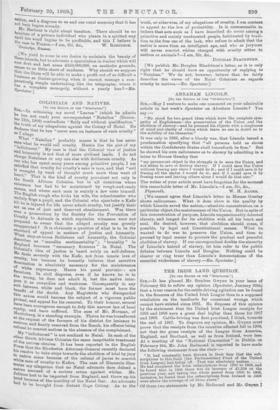ABRAHAM LINCOLN.
[To THE EDITOR OP 'rue "SrmorA.Tolt."J SIR,--May I venture to make one comment on your admirable article in last week's Spectator on Abraham Lincoln? You say :— " Ile stood for two grand ideas which have the complete sym- pathy of Englishmen—the preservation of the Union and the abolition of slavery—and he pursued his objects with a siugleuess of mind and clarity of vision which leave no one in doubt as to the nobility of his character."
it was only in 1863, after a bloody war, that Lincoln issued a proclamation specifying that "all persons held as slaves within the Confederate States shall henceforth be free." But he showed his own callousness as to slavery by admitting in a letter to Horace Greeley that
"my paramount object in the struggle is to save the Union, and not either to save or destroy slavery. If I could save the Union without freeing any slave 1 would do it ; and if I could save it by freeing all the slaves I would do it; and if I could save it by freeing some and leaving others alone I would do that also."
The writer of your article must have forgotten for the moment this remarkable letter of Mr. Lincoln's.—I am, Sir, &c.,
Plymouth. W. H. ALGER. [We cannot agree that Lincoln's letter to Horace Greeley shows callousness. What it does show is the quality by
which Lincoln saved the nation,—absolute concentration on a particular object, the maintenance of the Union. But ie spite of this concentration of purpose, Lincoln unquestionably detested slavery, and longed for its abolition with all his heart and soul. Ho desired, however, that abolition should come, if possible, by legal and Constitutional means. What he wanted to do was to preserve the Union, and then to proceed by legal means to procure the gradual and peaceful
abolition of slavery. If our correspondent doubts the sincerity of Lincoln's hatred of slavery, let him refer to the public debates between Lincoln and Douglas. Nothing could be clearer or ring truer than Lincoln's denunciations of the essential wickedness of slavery.—En. Spectator.]










































 Previous page
Previous page